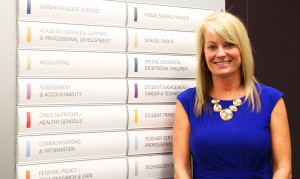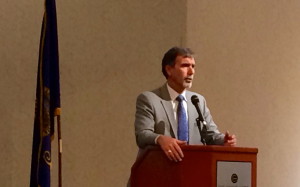The leaders of two prominent Idaho education groups are giving early positive reviews to schools chief Sherri Ybarra’s new budget proposal.

On Sept. 2, Ybarra released her 2016-17 public school budget proposal, which calls for increasing K-12 spending by 7.5 percent, or an additional $110 million more than this year. Ybarra’s budget would also increase funding for teacher pay and restore school districts’ operational funding (sometimes called discretionary funding in state government lingo) to pre-recession levels reached in 2009. (Click the highlighted text at the end of this sentence for a spreadsheet containing Ybarra’s 2016-17 budget proposal).
For next year, Ybarra is seeking a slightly larger funding boost than the one lawmakers approved for the current year, when they increased public school spending by 7.4 percent, or $101.2 million.
Idaho Education Association President Penni Cyr said teachers are “very excited about the budget” because of the recommended spending increase and the second installment of funding for the career ladder teacher salary program approved by the 2015 Legislature.

“What is significant is Superintendent Ybarra recognizes the Legislature’s Constitutional obligation to fully fund public education,” Cyr said. “Her request goes a long way toward that mandate.”
Ybarra’s budget proposal would return the state to 2009 operations funding levels, but does not account for inflation or any increased costs districts absorbed, Cyr said. Nevertheless, Cyr called it “a great start in the right direction.”
Leaders of the statewide teachers union met with Ybarra and her team during the budget development process, and were able to pass along suggestions and priorities, Cyr said.
Idaho Association of School Administrators Executive Director Rob Winslow also praised Ybarra’s proposal, saying it fulfills both of the IASA’s top two legislative priorities of paying for the career ladder salary plan and restoring cuts to operations funding.
“All of us are pretty supportive of it,” Winslow said. “We at IASA like the budget, like the amount and like the overall percentage increase.”

Winslow said he met with Ybarra’s team on several occasions during the budget setting process and sat down with her personally in August as the proposal was coming together.
“There was definitely a lot of input from people (in the education field),” Winslow said. “She says she met with us, and she really did. Certainly the budget reflects where we would like to see it go.”
Winslow was especially supportive of restoring the cuts to operations funding, a school district funding source that was cut drastically in response to the Great Recession.
“We’ve been lobbying for that for years, and to finally get it done would be great,” Winslow said.
Cyr and Winslow said they have not met with Ybarra over the budget since Ybarra published the spending plan Sept. 2, but Winslow said he will reconnect with Ybarra in the coming days. When Winslow meets with Ybarra, he plans to ask her about a handful of funding initiatives that had not appeared in past budgets, including $5 million toward literacy proficiency, $300,000 for a rural schools initiatives incubator and a handful of new grants.
“We just don’t understand exactly what those are because they are new, and just want to know a little bit more about them and see how the governor’s budget comes in,” Winslow said. “Other than that, we are pretty pleased and don’t see any real red flags.”
Idaho School Boards Association Executive Director Karen Echeverria was traveling to regional meetings this week, and efforts to reach her for reaction to Ybarra’s budget were unsuccessful.
Ybarra’s budget proposal represents the first of many steps in the state’s lengthy budgeting process. Gov. Butch Otter will present his own budget proposal during his State of the State address on Jan. 11, and legislative budget writers will devote the following 90 days to a series of budget hearings and workshops as they hammer out the state budget.
Both chambers of the Legislature must then approve every individual budget and avoid Otter’s veto stamp — a process that may not be completed until March or April.
